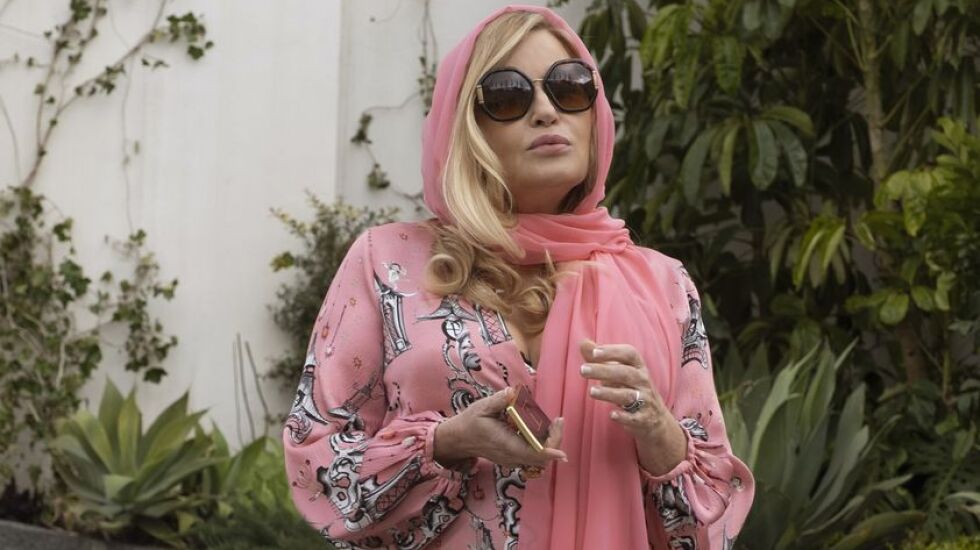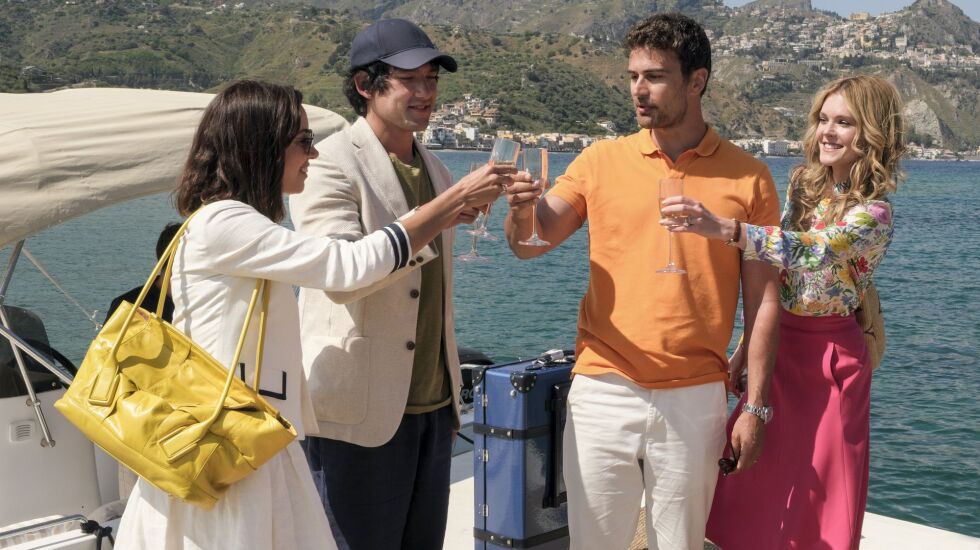
I’ll admit that when Mike White’s slicing social satire “The White Lotus” debuted on HBO in the summer of 2021, I didn’t see it becoming such a critical and commercial and awards-buzz favorite. In my mixed, two-and-a-half-star review, I gave the series props for being occasionally intriguing but said the characters in the darkly twisted murder mystery were “a colorful bunch of blithering, privileged dolts — most of whom are so obnoxious you’d want to move away from their table if you were stuck next to them at the restaurant.”
For the hotly anticipated Season Two of an anthology series that could continue for years, with a new cast and a fresh locale each time around, White returns to the same formula and we’re once again introduced to a colorful bunch of blithering, privileged dolts and they’re plenty obnoxious, to be sure — but this time around, if I were stuck next to them at a restaurant, I’d actually want to inch closer to eavesdrop on their lives. They’re just a little more interesting, a little more fascinating in a human train-wreck kind of way, a little more … wonderfully awful (in most cases).
“The White Lotus” offers up all kinds of social commentary about class warfare, but at its core this is a wish-fulfillment experience for the viewer. We get to soak in the lives of the obscenely wealthy and bask in the beautiful sights and sounds of their world — all the while reveling in the Schadenfreude of seeing how deeply, profoundly and spectacularly unhappy they are. Yeah! Take that, rich people! You might be on a vacation that costs more than most people make in a year, but your lives SUCK!
As was the case with Season One, we start at the end of the week, with at least one dead body — and then flash back seven days earlier, as a group of guests arrive at the White Lotus resort’s luxurious Sicily branch. And my goodness is the location cinematography spectacular, whether we’re on the island or we make some side excursions to beautiful locales (including the site of a particularly memorable sequence in “The Godfather”). This season’s group:
- The sardonic Harper (Aubrey Plaza) and her husband Ethan (Will Sharpe), who has just made a fortune selling his tech company, joined by Ethan’s alpha-dog former college roommate Cameron (Theo James), an investment bro, and Cameron’s wife Daphne (Meghann Fahy), a stay-at-home mom who is ready to let loose and party.

- Three generations of the Di Grasso family: the recently widowed and ever-flirtatious Bert (F. Murray Abraham), who keeps telling the locals “We’re Sicilian too,” because his grandmother is from a nearby village; Bert’s Hollywood hotshot son Dom (Michael Imperioli), a sex addict going through a divorce, and Dom’s earnest and naïve son Albie (Adam DiMarco).
- Jennifer Coolidge’s narcissistic and clueless zillionaire Tanya (the only returning main character from the first season), her now-husband Greg (Jon Gries), who is beginning to doubt the marriage, and Tanya’s beleaguered assistant Portia (Haley Lu Richardson), who yearns to live a life beyond “doom-scrolling” and jumping into action whenever Tanya barks orders at her.
Adding a great deal of spice to the proceedings are a couple of locals: the beautiful and cheerfully manipulative sex worker Lucia (Simona Tabasco) and her best friend, the aspiring singer Mia (Beatrice Granno), who wind up getting entangled with a number of the guests, much to the disapproval of the rigid hotel manager Valentina (Sabrina Impacciatore). Then there’s Tom Hollander’s aristocratic Brit, Quentin, who is like something out of a Truman Capote novel and befriends Tanya, recognizing in her a certain shared melancholy. (“It’s a good feeling when you realize someone else has money,” says Tanya. “You don’t have to worry about them wanting yours.” It’s a line both terribly funny and terribly sad.)
Sexual hijinks abound, sometimes to great comic effect, sometimes resulting in potentially irrevocable fractures to relationships (and in one case, someone’s health). A number of characters turn out to be something more than our initial impressions, e.g., Daphne, who at first seems like a superficial and insufferable Instagram-mom, reveals a more thoughtful and complex side, while the outwardly odious Dom becomes more sympathetic, and the hard-ass Harper proves to be more vulnerable than we expected.
I’ve seen the first five episodes of the seven-episode run, and while much transpires, we still have little clue as to which character(s) will be killed, and who will be doing the killing. It’s a tribute to the depth of the writing and the excellent work by the ensemble that whoever winds up floating in the sea, I’m gonna feel bad for them but I’ll also probably understand why someone wanted them gone.







